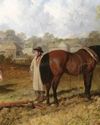
“Hardworking and efficient housewives know what they have to do in the service of this great German family – the German people – if it has to overcome temporary small shortages. They simply do their shopping in accordance with the interest of the great German family!” So said Rudolf Hess, deputy Führer of the Nazi Party, in a speech in 1936. He went on to elaborate on what was expected of “good” German women: “They do not attempt to buy expressly that which is in short supply at the time, but instead buy those things which are available in abundance and prepare them in such a way that they look really good and taste really good to their husbands and children. No good German housewife particularly mourns the quarter-pound of pork which, from time to time, she now fails to get.”
Food was a key concern in the Third Reich: from their rise to power in the early 1930s through to the Second World War, the Nazis always sought to control what was grown in the fields and eaten by the nation. This was one way in which they would meet the policy objective of autarky, or economic self-sufficiency.
To never repeat the shortages and hardship during and after the First World War – when potato harvests failed and enemy naval blockades cut access to imports, which accounted for around a third of the nation’s food – the Nazis aimed to make Germany self-sufficient. They would improve and control food production, and change people’s eating habits. Imported goods like oranges would need to become a thing of the past. In addition, any foods requiring imported fodder (feed for livestock) to produce, such as meat and butter, would be less abundant, as the regime looked to reduce the reliance on such imports.
この記事は BBC History UK の October 2022 版に掲載されています。
7 日間の Magzter GOLD 無料トライアルを開始して、何千もの厳選されたプレミアム ストーリー、9,000 以上の雑誌や新聞にアクセスしてください。
すでに購読者です ? サインイン
この記事は BBC History UK の October 2022 版に掲載されています。
7 日間の Magzter GOLD 無料トライアルを開始して、何千もの厳選されたプレミアム ストーリー、9,000 以上の雑誌や新聞にアクセスしてください。
すでに購読者です? サインイン

Viking mussels
ELEANOR BARNETT digs into archaeological research to recreate a Viking-cum-AngloSaxon seafood dish from medieval York

Fingers, frog's and fairies
Fortune telling was all the rage in the 16th and 17th centuries, and practitioners would stop at nothing to tap in to the supernatural. Martha McGill tells a story of Highland seers, tarot cards and encounters with the spirit world

Nothing matches being with Alexander the Great on foot in the Hindu Kush
AT OUR LITTLE FILM COMPANY, MAYA VISION, we recently took the decision to digitise all of the rushes of our key films so that we could dispose of hundreds of boxes of tapes that had been kept in storage, throwing out stuff we thought we would never need again.

Library of the dead
Highgate Cemetery, created as a fashionable resting place for wealthy Victorian dead, is a veritable who's who of London's great and good. PETER ROSS roams the avenues of this most atmospheric necropolis

Slavery, exploitation and racism. These tragedies have long dominated histories of Africa. But there's another way to tell this story. And it's one that puts Africans right at the centre of their continent's extraordinarily rich and vibrant past
An 1414, in the Chinese city of Nanjing, a giraffe caused a stir. Amid a crowd of shocked, noble spectators, an official, leading the creature via a rope tied round its face, presented it to China's Yongle emperor. His officials said it was a qilin - an auspicious unicorn - which his sage governance had made appear.

England's forgotten hero
When the Hundred Years' War was reaching a climax, one man was fighting tenaciously to secure the English claim to the French crown. So why, asks Joanna Arman, is Henry V's formidable brother, John, Duke of Bedford, not better known?

HENRY III AND THE MAGNA CARTA THAT MATTERED
King John's sealing of a charter at Runnymede in 1215 is one of the most feted moments of the Middle Ages. Yet, writes David Carpenter, it was the charter issued by his son 10 years later that became fundamental to England's history

Gutenberg publishes a pioneering new book
‘The printing press triggers an information revolution

How empire ruptured rural Britain
We know that enslaved Africans and their descendants suffered in the distant colonies of empire. But, as Corinne Fowler explains, the colonial system also had dire impacts on people in the countryside of the 'motherland'

"I FELT VERY ALONE IN A WORLD GONE HORRIBLY MAD"
It was a moment of possibilities, dislocation and dread. Dan Todman tells the story of the 1.5 million urban Britons evacuated to the countryside at the start of the Second World War